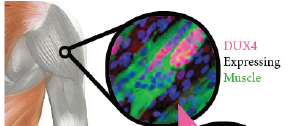Posted by Gregory J Block MSc PhD on Nov 4, 2015

We are excited to announce that Friends of FSH Research will support a study from the laboratory of Joel Chamberlain at the University of Washington. The study builds upon Dr. Chamberlain's initial success of tracking the expression of DUX4 in the muscles of mice. By optimizing conditions, Dr. Chamberlain has the ability to detect DUX4 in human muscle biopsies. Understanding the distribution of DUX4 in human muscle is a critical piece of the puzzle to further understanding how the protein damages the muscle.
Why is this a big deal? Well, for one, we struggled for many years to see DUX4 anywhere - anyone who tells you studying DUX4 is easy to do is a filthy liar! We started by being able to detect the genetic changes that allow DUX4 to turn on, and only recently have been able to detect proof of the protein in cells cultured in a dish from patients with FSHD. There is still not strong data to directly show that DUX4 protein is actually expressed in a human muscle.
Dr. Chamberlain will be collaborating with Leo Wang, a neurologist at the University of Washington, to carry out this study.
Read more details on the project here.





Connect with us on social media